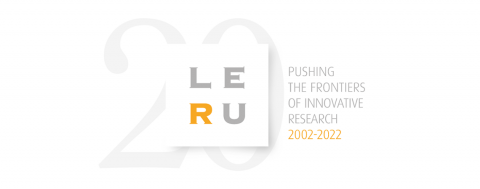
LERU’s 20th anniversary (League of European Research Universities)
Founded in 2002 at Leiden, the LERU (League of European Research Universities) celebrated its 20th anniversary. On this occasion, representatives of the 23 member universities, including Université Paris-Saclay, gathered during a conference dedicated to the event, followed by the General Assembly held annually. An opportunity to recall the role of universities in European scientific research policy, their contribution to making sustainable and resilient societies, and the importance of maintaining their academic freedom.
20 years of collaboration between universities in favour of research
Bringing together 23 universities, the aim of the LERU (League of European Research Universities) is to influence the policies and promote the exchanges of best practices on the European stage.
LERU strongly believes that basic research plays an essential role in the innovation process and significantly contributes to the progress of society.
Drawing on the impressive academic potential and expertise of its network, LERU has a strong and significant impact on research, innovation and higher education policy in Europe.
23 universities members of LERU
The LERU rectors met from 19 to 21 May at Leiden, an emblematic place, since the LERU was founded there in 2002 with originally 12 members. Today, there are 23 members, among them 3 French universities (UNISTRA, Sorbonne Université and Université Paris-Saclay).
Université Paris-Saclay became a LERU member in 2020, in continuity with Université Paris-Sud (Université Paris-Sud became Université Paris-Saclay in 2020).
Building resilient and sustainable societies
On the occasion of the 20th anniversary of the LERU, a number of speakers discussed several topics, including the current challenges in the transition towards sustainable and resilient societies.
European Commissioner Mariya Gabriel highlighted the contribution universities make to current EU policy goals:
“Universities are at the crossroads of education, research and innovation, and are vital organisations to address the forthcoming green and digital transformations that we need to accelerate, transformations that will have an impact on critical sectors of our society and economy.”
(Mariya Gabriel, from LERU article Universities stand ready for present and future challenges)
Academic freedom: signature of the Leiden Principles
"Throughout the conference, speakers expressed concern that academic freedom is increasingly under threat around the world, and requires greater protection." [...]
Professor Leptin underlined the role universities play in supporting freedom in society. “Many of us are from a generation that took it for granted that we had democracy, freedom of speech, freedom of research, etc, but we are beginning to see that some of these things cannot be taken for granted,” she said. “Our universities must be the wellspring of independence and critical thinking in society.”
(from LERU article Universities stand ready for present and future challenges)
The "Leiden Principles" were signed at the conference by representatives of university networks from around the world. The five principles revolve around the key notions of trust, diversity, openness, stewardship and freedom.
To find out more
- Read the article Universities stand ready for present and future challenges (LERU website)
- LERU website: www.leru.org
- Interview of Pr. Hester Bijl, Rector Magnificus of Leiden University, on the occasion of LERU's 20th anniversary
